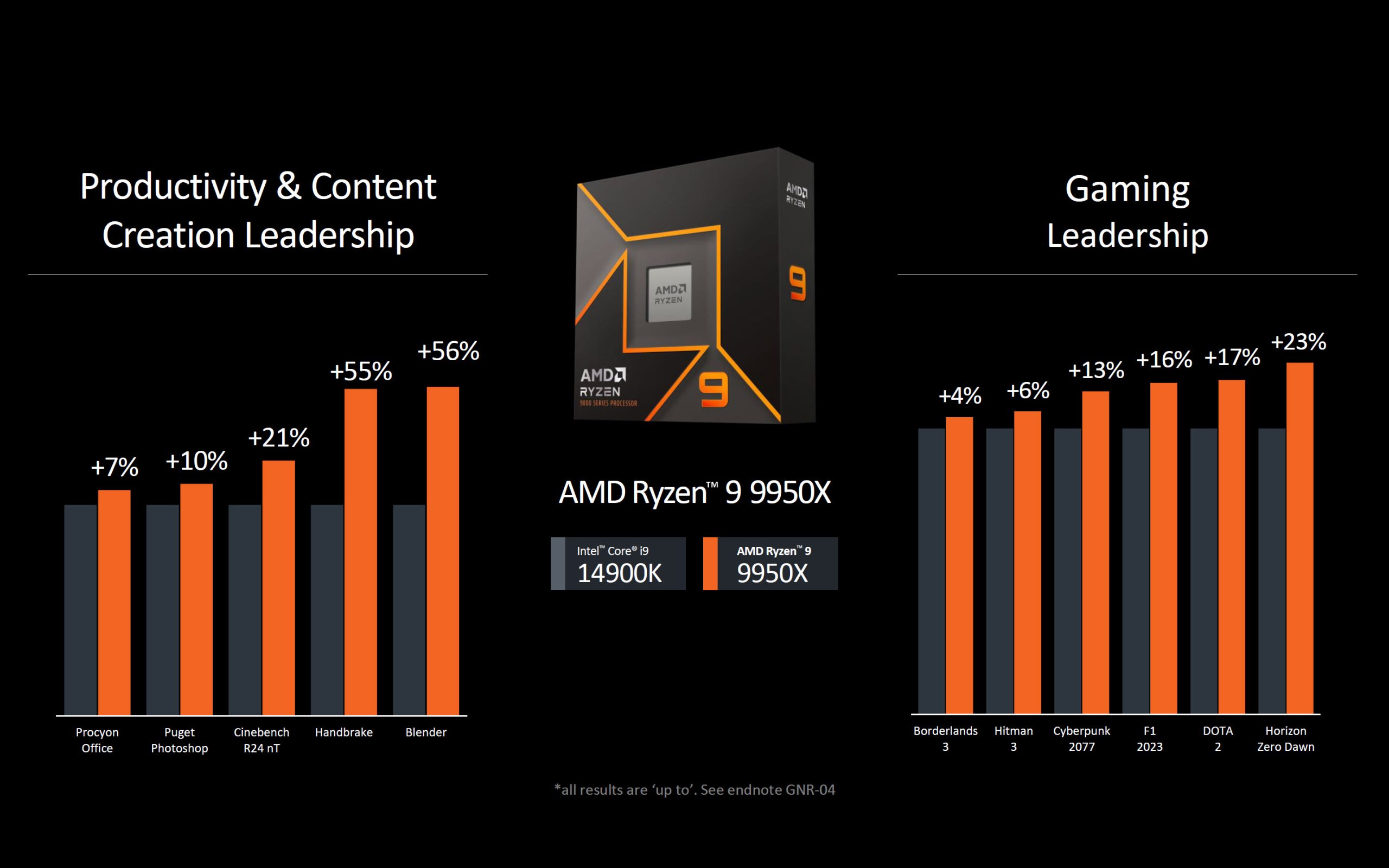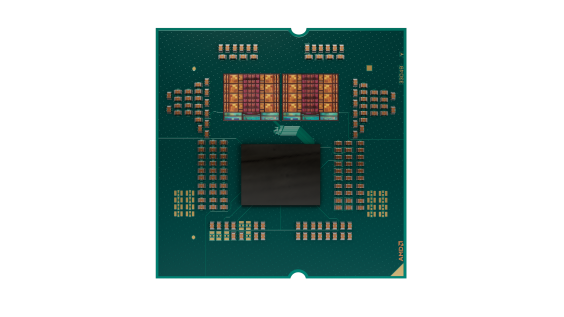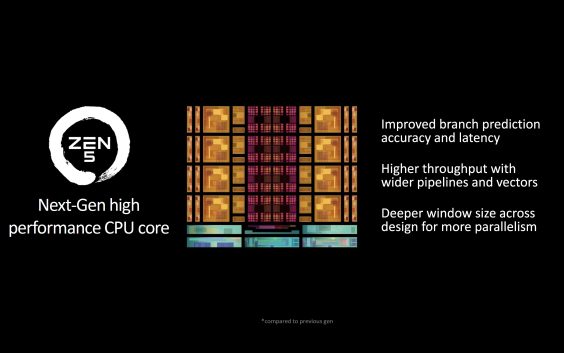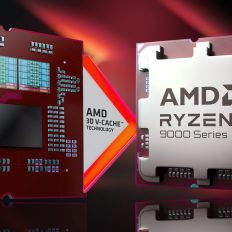AMD officially lifted the curtains off its next-generation Ryzen 9000 Dekstop CPUs that are going to feature the Zen 5 core architecture at Computex 2024. The next-generation lineup will be bringing some drastic changes, not only limited to the CPU and we are going to talk about what you can expect in terms of specifications, performance, and prices.
AMD Ryzen 9000 'Zen 5' Desktop CPUs, 4nm Upgraded Architecture For The AM5 Platform
It's been more than a year since AMD first introduced its AM5 platform alongside a brand new CPU family which we all know as Ryzen 7000 "Raphael". These chips brought in some impressive gains on the single and multi-threaded side of things while enabling higher efficiency than Intel's 13th & 14th Gen CPUs.
The company soon followed the launch with its new 3D V-Cache parts, the Ryzen 7000X3D family, which extended the SKUs range in the 12 and 16-core territory, offering another level of uplift for gamers. It's been more than a year since the launch of these parts and all eyes are on AMD's next-gen family, the Ryzen 9000 "Granite Ridge" Desktop CPUs.

AMD Ryzen 9000 'Zen 5' Desktop CPU Expected Features:
- Up To 16 Zen 5 Cores and 32 Threads
- Up To 16% IPC Improvement With Zen 5
- Brand New TSMC 4nm process node with 6nm IOD
- Up To 23% Faster Gaming Performance Versus Intel 14th Gen
- Up To 56% Faster Multi-Thread Performance Versus Intel 14th-gen
- Support on All Existing AM5 Platforms With LGA1718 Socket
- 800-Series Motherboard Introduction (X870E/X870)
- Faster Dual-Channel DDR5 Memory Support
- Up To DDR5-5600 Native (JEDEC) Speeds
- 28 PCIe Gen5 Lanes (CPU Exclusive / 24 Usable)
- 65W-170W TDPs
The AMD Ryzen 9000 Desktop CPU family, codenamed Granite Ridge, is based on the latest Zen 5 core architecture and targets high-performance Gaming PCs. The family is bringing a range of new features with the Zen 5 cores being the highlight while being supported on existing and upcoming AM5 platforms with improved I/O and DDR5 memory support.
Ryzen 9000 CPU Chip Shot:
AMD Zen 5 Core Architecture - Further Tweaking The Zen Architecture For A 16% IPC Uplift
So before we talk about the Ryzen 9000 Desktop CPU family, we first take a glance at the new and improved Zen 5 core architecture which offers:
- Improved branch prediction accuracy and latency
- Higher throughput with wider pipelines and vectors
- Deeper window size across the design for more parallelism
In several aspects, the AMD Zen 5 core architecture offers up to a 2x increase such as the Instruction Bandwidth for the front-end instructions, data bandwidth (L2 to L1 and L1 to FP), and AI perf (AI & AVX512 Throughput). The Zen 5 CPU cores (CCDs) are based on the TSMC 4nm process node while the IOD is based on the TSMC 6nm process node. They come in the same peak config of 2 CCDs and 1 IOD on consumer platforms.

These new changes have resulted in a significant IPC uplift averaging 16% versus Zen 4. In certain cases, the Zen 5 core can reach up to +35% IPC such as (Geekbench 5.4 AES XTS) and another key area that has been improved upon is the L2 and L3 cache structuring. AMD also made some significant changes to the IMC which now result in much higher EXPO/XMP memory support and the Infinity Fabric clock has been raised from 2000 MHz on Zen 4 to 2400 MHz on Zen 5 with DDR5-5600 speeds natively supported.
AMD Ryzen 9000 Desktop CPU Lineup
So as for the lineup, the AMD Ryzen 9000 "Granite Ridge" family is composed of four SKUs to start. These include the Ryzen 9 9950X, Ryzen 9 9900X, Ryzen 7 9700X and the Ryzen 5 9600X. Let's take a look at the specifications of these chips.

AMD Ryzen 9 9950X 16-Core Desktop CPU
The AMD Ryzen 9 9950X "100-000001277" CPU is the flagship offering with two Zen 5 CCDs and a single IOD. The CPU offers 16 cores, 32 threads, a base clock of 4.3 GHz, and a max boost clock of up to 5.7 GHz. It comes with 80 MB of cache (64 MB L3 + 16 MB L2) and has a TDP of 170W. Now in terms of clock speed, while the boost clock is identical to the Ryzen 9 7950X, the base clock is slightly dialed down by -200 MHz but we can expect a lot of efficiency coming out of this flagship product, especially in terms of multi-threaded performance.

The AMD Ryzen 9 9950X also packs 3 chiplets, two of which are the Zen 5 CCDs, each with 8 cores, 16 threads, and 32 MB of L3 cache while the third chiplet is the IO die or IOD which is based on the TSMC 6nm process node is nearly identical to the IOD we saw on the Ryzen 7000 chips but with a few minor adjustments. The IOD retains the same 2 compute units based on the RDNA 2 graphics architecture and comes clocked at 2200 MHz. The CPU comes with full support for overclocking on the CPU, & memory, & has all tech support for PBO2, Curve Optimizer, and support within the Ryzen Master utility. AMD also recommends a liquid cooler for optimal performance with this behemoth.
AMD Ryzen 9 9900X 12-Core Desktop CPU
Next, we have the AMD Ryzen 9 9900X "100-000000662" CPU, the 12-core and 24-thread variant. This chip has a base clock of 4.4 GHz and a boost clock of up to 5.6 GHz with a 76 MB cache. The interesting thing with this chip is that it has a TDP of 120W much lower than the 170W of Ryzen 9 7900X chips.
Once again, while the chip retains the same boost clock speed as the Ryzen 9 7900X, the base clock sees a -300 MHz reduction which is once again to fit within the 120W power limit but once again, the 12-core should be able to boast some nice multi-threaded capabilities. Following are the TDP comparisons between the four chips of this generation with the prior one:
- Ryzen 9 7950X (170W) -> Ryzen 9 9950X (170W)
- Ryzen 9 7900X (170W) -> Ryzen 9 9900X (120W)
- Ryzen 7 7700X (105W) -> Ryzen 7 9700X (65W)
- Ryzen 5 7600X (105W) -> Ryzen 5 9600X (65W)
AMD Ryzen 7 9700X 8-Core Desktop CPU
For the more mainstream users, AMD has the Ryzen 7 9700X "100-000001404" which is an 8-core CPU with 16 threads, a base clock of 3.8 GHz, a boost clock of up to 5.5 GHz, 40 MB of cache (1 CCD with 32 MB L3 + 8 MB L2), and a low TDP of 65W which is also much lower than the 105W TDP featured on its predecessor, the Ryzen 7 7700X.

The Ryzen 7 7700X has a 105W part while the AMD Ryzen 7 9700X has a 65W part which is almost half its TDP and that means that the clocks do take a slight bit of hit with the base clock being -700 MHz lower but the boost clock is rated at +100 MHz. For the 65W SKUs, AMD recommends using a premium air cooler for optimal performance but even with such a low TDP, AMD is making sure that enthusiasts don't miss out on the OC and tuning features as the Ryzen 7 and Ryzen 5 chips come with all the goodies as the higher-end Ryzen 9 SKUs based on the Zen 5 core architecture.
AMD Ryzen 5 9600X 6-Core Desktop CPU
Lastly, the AMD Ryzen 5 9600X "100-000001405" CPU features 6 cores and 12 threads. This chip has a base clock of 3.9 GHz maximum boost clock of up to 5.40 GHz and packs 38 MB cache and the same 65W TDP. Only the AMD Ryzen 7 and Ryzen 5 CPUs see a clock bump over their predecessor while the Ryzen 9 chips retain the same clock speeds.

The AMD Ryzen 5 9600X sees a 100 MHz boost clock improvement over its predecessor, the Ryzen 7 7600X but comes with a lower base clock of -800 MHz.

AMD Ryzen 9000 "Granite Ridge" Desktop CPUs Preliminary Specs:
| CPU Name | Architecture | Cores / Threads | Base / Boost Clock | Cache | Graphics (Integrated) | Memory Support | TDP | Price (MSRP) |
|---|---|---|---|---|---|---|---|---|
| Ryzen 9 9950X | Zen 5 | 16/32 | 4.3 / 5.7 GHz | 64 MB L3 + 16 MB L2 | 2 x RDNA 2 CUs | DDR5-5600 | 120W | $699 USD? |
| Ryzen 9 9900X | Zen 5 | 12/24 | 4.4 / 5.6 GHz | 64 MB L3 + 12 MB L2 | 2 x RDNA 2 CUs | DDR5-5600 | 120W | $549 USD? |
| Ryzen 7 9700X | Zen 5 | 8/16 | 3.8 / 5.5 GHz | 32 MB L3 + 8 MB L2 | 2 x RDNA 2 CUs | DDR5-5600 | 65W | $399 USD? |
| Ryzen 5 9600X | Zen 5 | 6/12 | 3.9 / 5.4 GHz | 32 MB L3 + 6 MB L2 | 2 x RDNA 2 CUs | DDR5-5600 | 65W | $299 USD? |
AMD Ryzen 9000 "Zen 5" Desktop CPU Performance
AMD also shares a few performance figures for its upcoming Ryzen 9000 "Zen 5" Desktop CPUs. The Ryzen 9 9950X has been compared against the Intel Core i9-14900K. It offers up to a +56% leap in productivity performance (+29.8% average uplift) and up to a +23% leap in gaming performance (+13.2% average uplift), a significant jump over Intel's flagship CPU. The performance was done on an AMD Radeon RX 7900 XTX GPU so it will be interesting to see how these chips fare with the RTX 40 series which loves extra CPU performance.

In gaming, the Ryzen 9 9950X should end up considerably faster than its Ryzen 7000 predecessors but we can expect Zen 5 3D V-Cache to further take this leap forward. AMD states that the improvement in game performance comes from the reduced latencies associated with the chip.
Also, it should be mentioned that AMD has also clarified that while Zen 5 is much faster than its older Zen 4 parts and the competition, Zen 4 3D V-Cache SKUs are likely going to remain the king but the difference between the last-gen X3D and the newest Non-X3D parts will be thinner this time which is great to hear since you can expect 3D V-Cache performance and faster multi-threaded capabilities out of these new Zen 5 chips.
Once again, the Ryzen 9000 3D V-Cache CPUs are also expected to launch later this year so for those who are only aiming for faster gaming numbers, it might be better to wait a bit more. AMD also recently updated its 3D V-Cache optimizer suite in the latest Ryzen chipset drivers ahead of the next-gen launch so it looks like the groundwork for them is already being laid out.

AMD also states that the Ryzen 9000 "Zen 5" Desktop CPUs make for the ultimate content creator AI platform with a 100% uplift in graphics bandwidth thanks to dedicated PCIe 5.0 lanes which the current Intel lineup lacks and a 20% AI acceleration in LLMs such as Mistral. Do note that AMD isn't incorporating an NPU on its Ryzen 9000 Desktop CPUs but the new architectural improvements lead to better AI performance than the competition.
Ryzen 9000 CPU Package:
There have also been some behind-the-door demos in addition to a few leaks that further explore the performance of these upcoming CPUs which you can check out below:
AMD Ryzen 9000 "Zen 5" Desktop CPU Pricing & Availability
No pricing details are currently shared, but we can expect the Ryzen 9000 CPUs to cost around the same ballpark as the Ryzen 7000 series. A few online listings suggest that the Ryzen 9 9950X might cost close to $600 US while the rest of the SKUs should be priced relatively around the same range as their predecessors as mentioned above.
Canada Computers has listed the chip for CAD 839.00 which is lower than the CAD 939.00 MSRP of the AMD Ryzen 9 7950X (the chip is currently listed for CAD 719.00 which converts to $522 US and we have seen it available under $500 US recently). The CAD 839.00 pricing converts to $610 US which is $90 US lower than the MSRP of the Ryzen 9 7950X which cost $699 US at launch and was replaced by the Ryzen 9 7950X3D at the same price but that chip is currently also available close to $500 US.
- Ryzen 9 9950X - CAD 839.00 ($610 US)
Besides Canada Computers, Bermorzone, a retailer based in the Philippines has also listed the preliminary prices for the entire Ryzen 9000 "Zen 5" Desktop CPU lineup. The prices are as follows:
- Ryzen 9 9950X - 38,000 Pesos ($647.93 US)
- Ryzen 9 9900X - 35,000 Pesos ($596.77 US)
- Ryzen 7 9700X - 24,000 Pesos ($409.21 US)
- Ryzen 5 9600X - 18,500 Pesos ($315.43 US)
Meanwhile, AMD confirms that the CPUs will launch in July and retail listings have pointed out a 31st July retail launch which is very close so we can expect the review spree to begin a few days before that. Overall, the Ryzen 9000 CPUs based on the new Zen 5 core architecture look very impressive and we can't wait to try them out ourselves once they are available.















